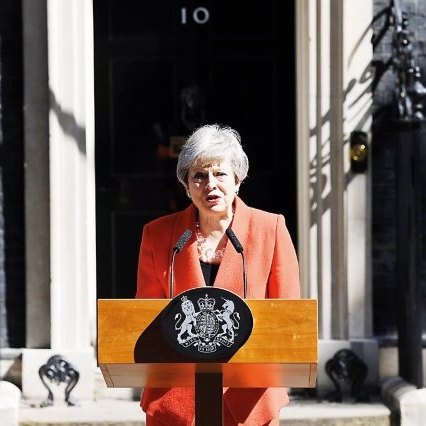click to dowload our latest edition
CLICK HERE TO SUBSCRIBE TO OUR NEWSLETTER


Published
5 years agoon
By
adminCNAAN LIPHSHIZ
Blamed by supporters of Britain’s departure from the European Union for delivering what they consider half measures, she was loathed also by opponents of that plan for her efforts to push it forward.
Ultimately, her desperate balancing act came to an end following the umpteenth failure in Parliament of one her many proposals for a compromise.
“It is and will always remain a matter of deep regret to me that I have not been able to deliver Brexit,” May said in her announcement outside 10 Downing Street in London.
She is leaving with “no ill will, but with enormous and enduring gratitude to have had the opportunity to serve the country I love”, May said at the conclusion of her speech, her voice cracking and tears filling her eyes as she uttered the final three words. She turned around abruptly, and headed back toward the prime minister’s residence, the sounds of her footsteps fading.
To her many opponents, May’s resignation could not have come soon enough. But for many British Jews, the departure of May, who probably will be succeeded by another member of her Conservative Party after she steps down on 7 June, means goodbye to one of the friendliest prime ministers in UK history.
“Prime Minister May followed a line of what you might consider leaders who are attentive and friendly to the Jewish community as well as to Israel,” said Jonathan Arkush, the previous president of the Board of Deputies of British Jews. Yet May, he said, “distinguished herself” even against that background.
The board’s current president, Marie van der Zyl, published a glowing endorsement of May on Friday, calling her a “true friend” to the community, and recalling how the UK under May has taken unprecedented positions in favour of the Jewish people and Israel.
Her cabinet led the adoption of the International Holocaust Remembrance Agency’s definition of anti-Semitism, which some anti-Israel activists reject for the ways it connects anti-Israel activity to anti-Jewish sentiment. It also has blacklisted the entire Hezbollah group rather than just its military wing.
In 2017, the UK under May said it would vote against a permanent article against Israel on the United Nations Human Rights Council. Last month, the rest of Europe followed in Britain’s footsteps.
Last year, Prince William ended a decades-long unofficial boycott on official visits to Israel by senior members of the British Royal House. May’s government had a central role in facilitating the visit.
May has even clashed with the foreign office over Israel, imposing her own policies and successfully “diluting its institutional hostility toward Israel”, said Jonathan Hoffman, a North London-based blogger and former vice chair of the Zionist Federation of Britain.
Diverging from the foreign office’s attempts to appear impartial on the Balfour Declaration – a seminal document in the history of Zionism – May embraced it openly during the statement’s centennial anniversary in 2017.
But one of her greatest gifts to British Jewry may have been what she appeared careful not to do: namely to use the anti-Semitism crisis raging with the opposition Labour Party for the benefit of her own Conservative Party.
Accusations of anti-Semitism directed at Labour officials exploded following the 2015 election of the far-left politician Jeremy Corbyn to lead the party. It was a traumatic turn of events for many British Jews, who had considered Labour their political home.
Corbyn is an anti-Israel stalwart who has defended an anti-Semitic mural, and said British-born “Zionists” don’t understand irony. He attracted thousands from the far left to join Labour. Discourse within the ranks became so toxic that many Jews, including prominent Jewish legislators, left the party.
Through it all, May resisted the temptation to exploit the issue for political gain, Arkush said.
British Jews will find a friend in virtually all Conservative politicians likely to take May’s place, Arkush said. They include Foreign Secretary Jeremy Hunt, Home Secretary Sajid Javid, and Environment Secretary Michael Gove.
As for Hoffman, an economist, he said he won’t support anyone committed to Brexit, which he calls “a tragedy if it happens”. He and many other Britons want a second referendum on the issue.
If not for Brexit, Hoffman said he would have supported May. “But right now that’s a bit ridiculous,” he said, “because British politics is all about Brexit – that’s the only thing on the agenda.”
